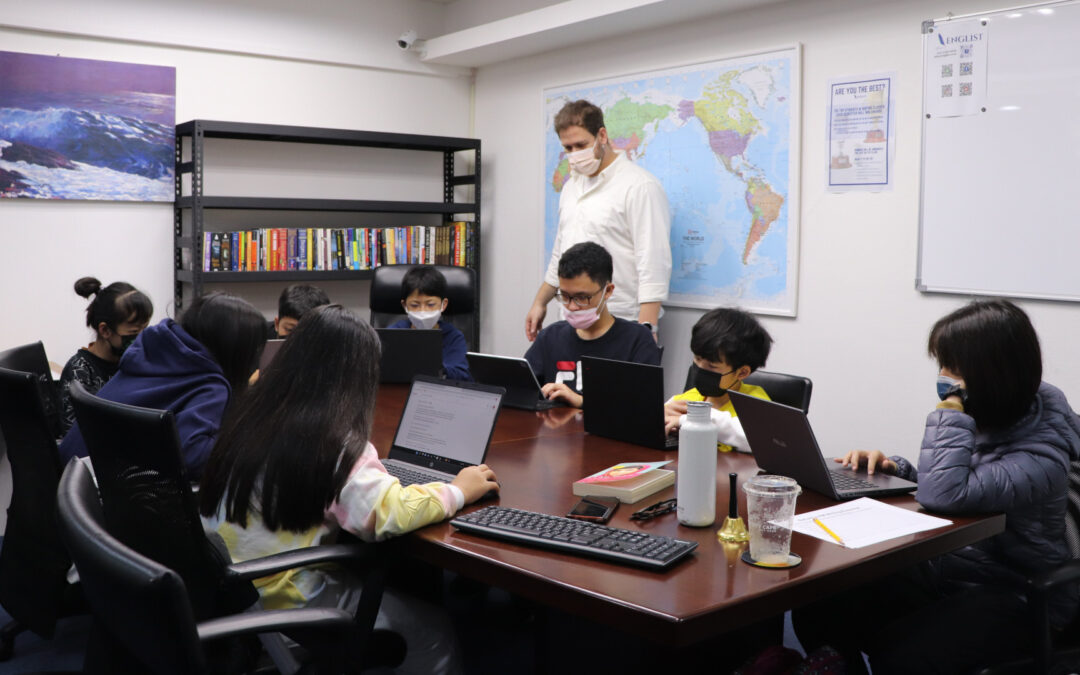When students hear this question, they usually think something like, “boring homework that I have to do because my teacher said so.” In the most superficial sense, this is sort of true, but that’s only part of the picture.
If students feel writing is simply a vehicle for busywork, they simply don’t understand its purpose or how to do it.
Writing is important, and once you realize what it is for, it is fun. But more than just fun, writing is a powerful tool, not just because it will help you get good grades and get into a good college so you can get a good job so you can buy a Ferrari or whatever, but because it will train you to do the most fundamental thing human beings do. That is because:
Writing is thinking
If there is one thing we want students to learn at Englist, it is this.
What does that mean though? You think things all the time, but you don’t write so much. However, they are the same if you think about it.
Have you ever thought about what a “word” is? One way to think about a word is that it is simply a thought with a language sound attached to it. What about a sentence? A series of thoughts combined, right? Another name for that is a complete idea. So writing words and sentences is literally thinking in a way for other people to see your thoughts.
Writing makes you put your thoughts out there so you and everyone else can really examine them. Writing crystalizes your thoughts, makes you put them in order, think about how others will receive them, and say them in a way so they can become the thoughts of other people.
In other words, writing is being able form thoughts, organize thoughts, and learning to give others your thoughts so those thoughts can spread. Another term for this is communication.
So: writing = communication = thinking. They are all the same thing. Learning to write means learning how to think and communicate clearly. If you can learn to communicate clearly and convincingly, then people not only want to hear what you have to say, but they will also start to agree with you.
This skill is the basis for much of education and certainly the basis for academic writing. If you are learning academic writing, it means you are learning to collect information, analyze ideas critically, think deeply, and then build everything you have learned into an essay, report, paper, or book that clearly and compellingly shows your thinking and ideas.
What about grades and scores?
Of course, there is a place for practicality in the world, and the reason you might be considering attending Englist is because you have some practical concerns. This might be because you want to improve your writing grades, or develop better reading comprehension, or to better prepare for a test or college application.
Englist helps with all of those things, but not by teaching tricks or testing strategies, but by teaching students how to communicate well and refine their thinking to be successful in academic settings. Colleges, standardized tests, teachers, professors, employers, scientific journals, so many things require essays, reports, or other clear forms of communication. You are learning to write because your future success depends on how well you can think and communicate. A well-written essay shows not just that you understand some topic, but that you can get other people to understand it as well. You get good grades and scores by being a strong thinker and communicator, so college prep is at the core of what Englist does.
In conclusion, being able to write and communicate means having the power to change minds, influence others, and then motivate them to action. It also allows you to have your ideas challenged and sharpened. As such, strong communication and critical thinking are the hallmarks of leadership and wisdom, and every successful person has developed communication and thinking ability in some way or another. And when you learn to think and communicate clearly – meaning, when you learn how to write well – not only will you do well in school, but you’ll become a more interesting, wise, and creative person overall.

